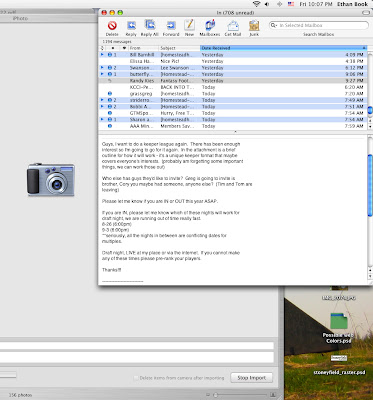
Now that I have your attention we really do need your help shooting our livestock, but when I say "shooting" I'm talking about taking pictures! From time to time I have come to you guys for some specific advice or help and I have never been steered in the wrong direction. So, after realizing our camera was slowly beginning to add a growing purple line to our pictures we began looking for a new camera. First we looked online, then we went to Best Buy, and finally we came home really confused.
A camera has become an important part of our farm as we have spent more time writing about our experiences and as we have had the opportunity to share a little bit about sustainable farming over on the
Epi-Log. We need something that we can use to take outdoor pictures of life on the farm and of course plenty of family snapshots. It is amazing how much cameras have changed since we bought our first digital about five years ago.
So, these are the cameras we have come up with:
Panasonic Lumix DMC-FS5K (10.1 MP)Sony Cyber-Shot DSC-W150 (8.1 MP)Canon Powershot SD1100IS (8.0 MP)It isn't like this is our top three or anything, but these are the ones that we were able to handle at Best Buy and liked the best. I would love to hear about your experiences with any of these brands or models. We have loved our Canon, but seemed to like the Panasonic and the Sony a little more this time around. Let us know what you think! Oh, I forgot to mention we are trying to land in the $200'ish range.
On the Farm Front:Not to leave you hanging on the farm/building front I'll give a quick update. Yesterday we were able to take the camper out to the farm so we have a place to lay the kids down when we work late. While we were out there I walked around the pigs a little and was happy with their growth. I'm really looking forward to them this winter!
Also, we spent a little time caulking the cracks around the posts. This will help keep the creepy-crawlies out ... we hope. Tomorrow evening I'm heading up it the rafters to run some more wire. Less the one month until we have to move out of our current house ... anyone wanna have a work day ;)
Edited - This is Becca, Ethan's wife. I'm hijacking his blog because he is working at the house with our plumber - and because I know his password! :) Thanks, everyone, for the great suggestions. I just found out, however, that Canon had put a faulty component in their cameras around the years we bought ours. This causes many of the camera displays to go out and/or produce distorted pictures. They are replacing or fixing these cameras free of charge, even if the warranty has expired. That's what I call great customer service! Here's the number if you have one with problems too: 1-800-828-4040
So, thanks again for your suggestions. Please feel free to keep them coming since it might help someone else who is looking for a camera.
 Since it is Labor Day weekend and people will be out enjoying time with family and friends I decided to just share a couple videos with you today and then again Monday. Actually, it is an audio today and a video on Monday. In the mean time I'm going to be doing as much labor as possible this Labor Day weekend. We are going to our free day tomorrow and do as much as we can in the house, so hopefully we will have some updates next week.
Since it is Labor Day weekend and people will be out enjoying time with family and friends I decided to just share a couple videos with you today and then again Monday. Actually, it is an audio today and a video on Monday. In the mean time I'm going to be doing as much labor as possible this Labor Day weekend. We are going to our free day tomorrow and do as much as we can in the house, so hopefully we will have some updates next week.



























